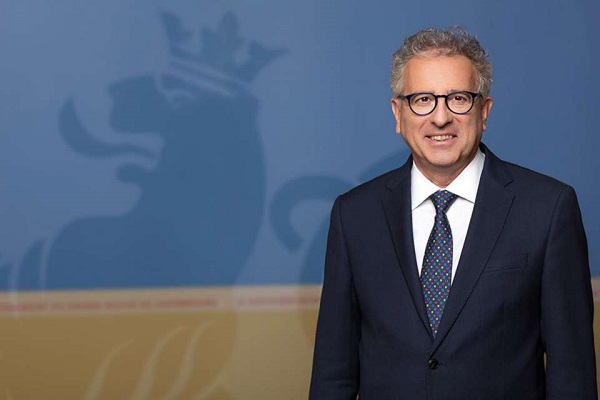 Pierre Gramegna, Luxembourg's Minister of Finance;
Credit: SIP / Yves Kortum
Pierre Gramegna, Luxembourg's Minister of Finance;
Credit: SIP / Yves Kortum
Luxembourg's Minister of Finance, Pierre Gramegna, presented today the state budget for 2021 at the Chamber of Deputies (Parliament).
Following the declaration of a state of emergency in March 2020, the government introduced a series of measures that revolve around two axes: health and social protection of the population and easing the economic burden of the crisis for companies and employees. In May 2020, the government put in place the “Neistart Lëtzebuerg” recovery programme. Measures revolve around the following three priority areas: encouraging employment, supporting businesses in the sectors most affected and promoting green economic recovery.
The 2021 budget is a continuation of these measures aimed at fighting the spread of COVID-19 and supporting a sustainable recovery. The budget emphasises five priorities: keeping investments at high levels, ensuring solidarity, promoting affordable housing, strengthening the country's competitiveness and promoting a sustainable economy. A coherent package of fiscal measures reinforces and complements these priorities.
Investment
An ambitious investment programme constitutes the backbone of the 2021 budget. To promote a sustainable recovery, the investment rate will stand at 4.3% of GDP in 2021, or €2.7 billion, which constitutes a historical record (apart from additional investments linked to the pandemic in 2020). This pre-crisis level of investment oscillated around 3.7% of GDP.
Solidarity
Almost half of the expenditure (48%) of the 2021 budget will be dedicated to social benefits, subsidies and grants in the social field. In particular, the funds needed to strengthen the public health system and health services will be substantially increased in 2021. Similarly, the employment fund and the socio-family investment fund will be equipped with the necessary means to enable them to support the labour market and help the most disadvantaged to face the challenges linked to the crisis.
Similarly, the budget introduces a series of fiscal measures in favour of social equity. In particular, in order to counter the abuses resulting from the use of the tax regime applicable to specialised and other investment funds in the real estate sector in Luxembourg, a real estate levy will be introduced from 1 January 2021. Real estate income generated by investment funds will thus be taxed at the rate of 20%, without the possibility of claiming deductions.
Affordable housing
The budget of the Ministry of Housing will be increased by 11% and the new special housing development support fund will benefit from a budget of €150 million to create and finance affordable housing.
At the fiscal level, the budget proposes several measures to fight against land speculation and to encourage energy renovation, including the reduction of the accelerated depreciation rate in the event of investment in new housing dedicated to rental and the introduction of a 6% depreciation rate in the event of energy renovation for buildings allocated to rental accommodation.
Sustainable economy
The 2021 budget provides for a budget of €547 million for investments in the field of mobility and climate. The emphasis is particularly on the continued development of the rail and tram network, as well as on soft mobility.
The introduction of a reduced subscription tax for sustainable investment funds is expected to further stimulate green and social investments, as well as consolidate the leading position of the financial centre in terms of sustainable finance.
The "polluter pays" principle in climate matters will take concrete form with the introduction next year of a CO2 tax of €20 per tonne, which will be gradually increased to €30 per tonne by 2023. The budget, however, ensures social equity by providing for social compensation measures, including an increase in tax credits of around €96 per year, as well as a 10% increase in the cost-of-living allowance from 2021.
Competitiveness
The 2021 budget provides for several measures to further strengthen Luxembourg's competitiveness. In particular, a total amount of €1 billion is planned for the period 2021-24 to advance the digitalisation of the economy.
To attract and retain the talents essential to Luxembourg's continued economic development, two innovative tax instruments are foreseen, namely a participation bonus, which employers can grant to deserving employees, and an updated "impatriates" system, including the possibility for employers to grant an impatriation bonus which will benefit from a 50% tax exemption.
Finance Minister Pierre Gramegna commented: “The 2021 budget is an exceptional budget for an exceptional time. The government has managed to tie up a package to meet the challenges of this unprecedented crisis for our country. The 2021 budget emphasises solidarity with employees and businesses, strengthening infrastructure, housing and sustainable recovery, thanks to investments at a record level”.








